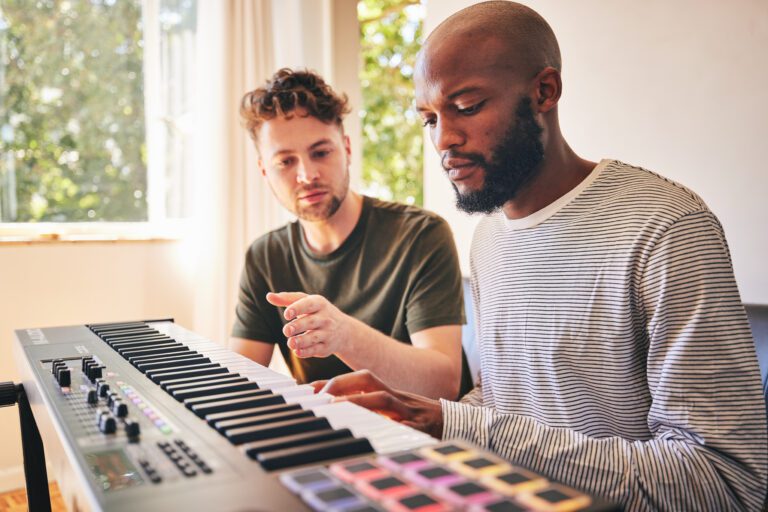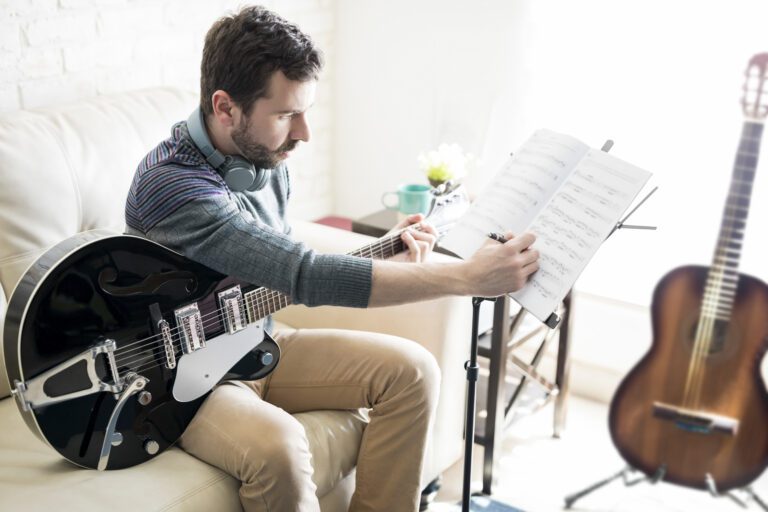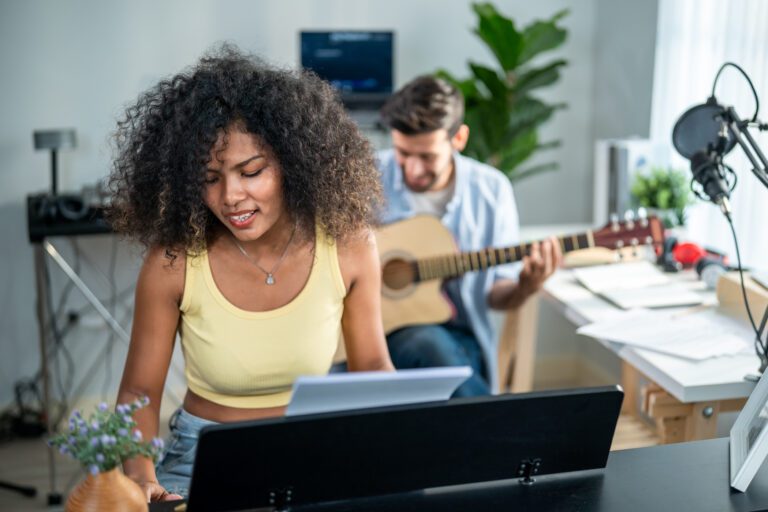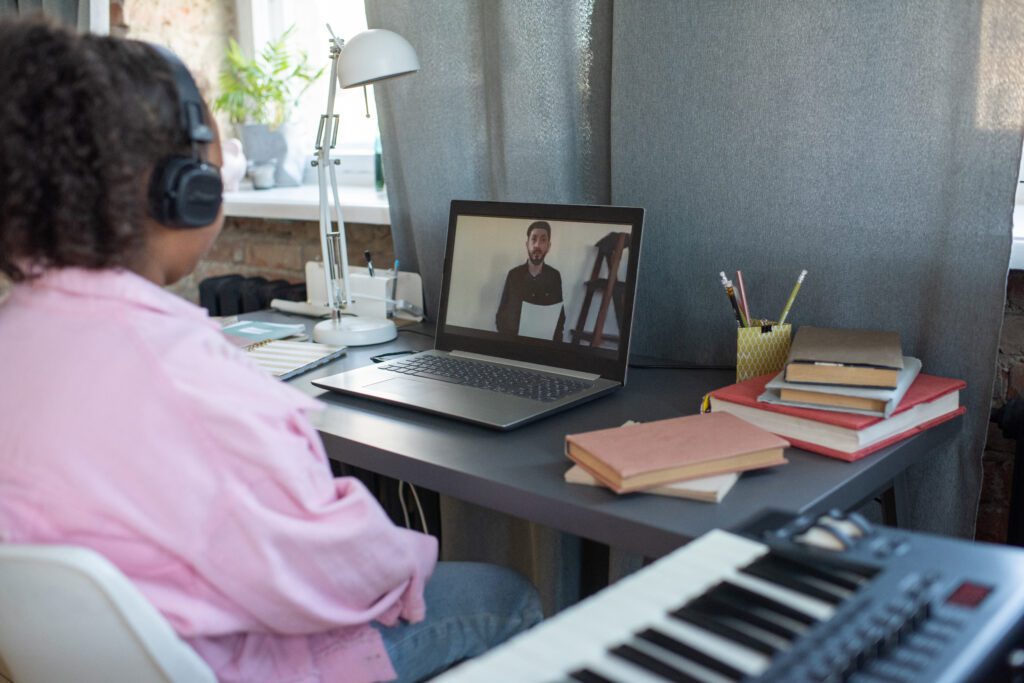Why Advanced Musicians Benefit from One-on-One Training
You’ve spent years mastering your instrument, practicing for hours, and maybe even performing on stage. But now, you feel stuck. You know there’s more to learn, but group lessons feel too slow, and self-learning leaves too many unanswered questions. So, what’s the next step? One-on-one training.
Private lessons are the secret weapon of advanced musicians. They provide personalized guidance, immediate feedback, and a customized learning experience that no group class or online tutorial can match. Let’s dive into why private training is essential for advanced musicians like you.
1. Tailored Learning Experience

Every musician has a unique journey. Some excel at technical skills but struggle with musical expression. Others may have an incredible ear but lack sight-reading abilities. One-size-fits-all learning simply doesn’t work for advanced musicians. This is where one-on-one training shines.
Customized Curriculum
Unlike group classes that follow a fixed syllabus, private lessons adapt to your specific needs and aspirations. Whether you want to specialize in jazz improvisation, perfect your vibrato on the violin, or develop a unique stage presence, your lessons are crafted to align with your goals.
For example:
- A classical pianist looking to expand into jazz will have lessons focused on swing rhythms, chord voicings, and improvisational techniques.
- A metal guitarist seeking better speed and dexterity will receive exercises tailored to shredding techniques and advanced picking patterns.
- A vocalist aiming to transition from pop to opera will focus on projection, breath control, and classical phrasing.
- Your musical growth is not dictated by a generic curriculum but by what you truly need to develop.
Adapting to Learning Styles
Some musicians learn best through visual cues, while others excel with aural training or kinesthetic techniques. A skilled mentor tailors lessons to suit your natural way of learning, ensuring you grasp complex concepts efficiently.
For instance:
- If you’re a visual learner, your instructor might use diagrams, color-coded sheet music, or video breakdowns.
- If you’re an aural learner, lessons may involve active listening exercises, call-and-response drills, and ear training.
- If you’re a kinesthetic learner, your mentor may incorporate hands-on techniques like rhythm tapping and muscle-memory drills.
- This kind of personalization enhances comprehension and retention, making your practice more productive and enjoyable.
Focusing on Strengths & Weaknesses
With one-on-one training, your teacher identifies your strongest skills and areas for improvement, offering specialized exercises to strengthen weak spots while enhancing your natural abilities.
For example:
- If you’re a pianist with strong technical skills but weak expression, lessons might include phrasing, dynamics, and storytelling techniques.
- If you’re a guitarist struggling with rhythm, your mentor will focus on timing exercises, metronome drills, and groove-building.
- If you’re a singer with great range but poor diction, you’ll work on articulation, enunciation, and vowel modification.
- The result? You become a well-rounded musician with a refined skill set, rather than just someone who “knows the notes.”
Goal-Oriented Approach
In private training, your goals determine the direction of your lessons. Whether you’re preparing for a professional audition, aiming for a Trinity College certification, or composing your own music, your teacher will create a step-by-step strategy to get you there.
- Imagine you have a big competition in six months. Your instructor will:
- Break down the repertoire into manageable sections.
- Work on stage confidence and performance techniques.
- Help you master nuances like dynamics, articulation, and phrasing.
- Prepare mock performances to simulate real-stage scenarios.
Instead of following a generic lesson plan, your training is an intensive, result-driven experience that sets you up for success.
2. Faster Progress with Immediate Feedback

Have you ever practiced something for weeks only to realize you were making a fundamental mistake the whole time? It happens to the best of us. The problem? Delayed feedback.
In group lessons or self-learning, you often don’t realize your mistakes until much later, making it harder to correct them. But in a one-on-one setting, your teacher catches errors immediately, helping you correct them on the spot.
Avoiding Bad Habits
When learning on your own, it’s easy to develop bad habits—poor posture, incorrect finger positioning, weak articulation—that become ingrained over time. Once these habits form, they’re difficult to unlearn. Immediate correction from a mentor ensures that mistakes are identified and addressed before they become permanent.
Real-Time Adjustments
Imagine trying to master a complex rhythm or a tricky run on your instrument. Without guidance, you might struggle for weeks, unsure of what’s going wrong. With a personal instructor:
- Your teacher identifies problem areas immediately and provides clear corrections.
- You get real-time demonstrations of correct techniques.
- Your progress is accelerated because you don’t waste time practicing errors.
Building Confidence Through Precision
Confidence in music comes from knowing you’re doing things the right way. When you receive immediate feedback, you’re constantly reassured that your playing is improving. This sense of certainty helps you perform with more confidence, whether in practice, recording, or live performance.
3. Mastering Advanced Techniques

Advanced musicians often hit a plateau where progress slows down. Why? Because complex techniques require expert guidance to master. Whether it’s polyrhythms, extended chord voicings, or high-speed alternate picking, one-on-one training provides the focused instruction necessary to break through technical barriers.
Breaking Through Technical Plateaus
If you’ve been stuck on a difficult passage or struggling with speed, your instructor will analyze exactly what’s holding you back and prescribe targeted exercises to overcome it. Whether it’s better finger independence for pianists, advanced bowing techniques for violinists, or double-kick control for drummers, private training offers the precision needed for mastery.
Developing Unique Stylistic Skills
At an advanced level, musicians don’t just need technique—they need artistry. One-on-one lessons help you develop signature styles, such as:
- Jazz phrasing & improvisation for pianists and saxophonists.
- Extended techniques like harmonics, tapping, or hybrid picking for guitarists.
- Microtonal singing & ornamentation for vocalists exploring world music.
Fine-Tuning Musical Expression
Your instructor will guide you in bringing out emotion and expression, ensuring every note conveys meaning. With expert feedback, you’ll refine your dynamics, phrasing, and articulation to transform technical skill into compelling artistry.
Advanced musicians don’t just play music—they tell a story. And mastering that storytelling requires expert mentorship.
4. Enhancing Stage Performance

Technical skills alone don’t make a great musician—stage presence, confidence, and audience engagement are just as crucial. Whether you’re performing at a local gig, an international competition, or a professional recording session, how you present yourself can make or break your performance.
Overcoming Stage Anxiety
Many musicians struggle with stage fright, no matter how experienced they are. One-on-one training helps you develop mental strategies to manage nerves, ensuring you perform with confidence, not fear.
Your mentor can guide you through:
- Breathing exercises to calm nerves before stepping on stage.
- Visualization techniques to mentally rehearse success.
- Simulated performances to help you get comfortable in front of an audience.
- With consistent training, the stage becomes a place of excitement rather than anxiety.
Perfecting Stage Presence
Stage presence isn’t just about playing well; it’s about connecting with your audience. A personal coach can help you:
Improve body language and gestures to enhance expression.
- Work on eye contact and movement to engage the crowd.
- Develop a commanding yet natural stage persona that keeps people captivated.
The best musicians aren’t just heard—they’re felt. And a mentor helps you achieve that level of performance.
5. Expanding Repertoire and Versatility

As an advanced musician, sticking to one genre or style can limit your growth. One-on-one lessons expose you to new styles, techniques, and compositions that expand your musical vocabulary.
Exploring New Genres
A good mentor introduces you to diverse musical forms—whether it’s jazz improvisation, Indian classical ragas, flamenco guitar, or progressive rock time signatures. This broadens your musicality and makes you a more well-rounded artist.
Imagine a rock guitarist learning:
- Blues phrasing to add emotional depth.
- Classical fingerpicking for intricate arrangements.
- Funk strumming to improve rhythm and groove.
- Each new skill enhances your primary style, making you a more dynamic musician.
Adapting to Industry Demands
- In today’s music industry, versatility is key. One-on-one training helps you:
- Learn multiple instruments if you want to become a multi-instrumentalist.
- Understand music production for composing and recording your own work.
- Develop sight-reading and ear training for session work or professional gigs.
- The more versatile you are, the more opportunities you’ll have as a musician.
Final Thoughts
For advanced musicians, one-on-one training isn’t just an upgrade—it’s a necessity. It accelerates progress, sharpens technique, builds confidence, and prepares you for professional opportunities in a way no other learning format can.
So, if you’re serious about taking your music to the next level, investing in private training is the smartest decision you can make.


